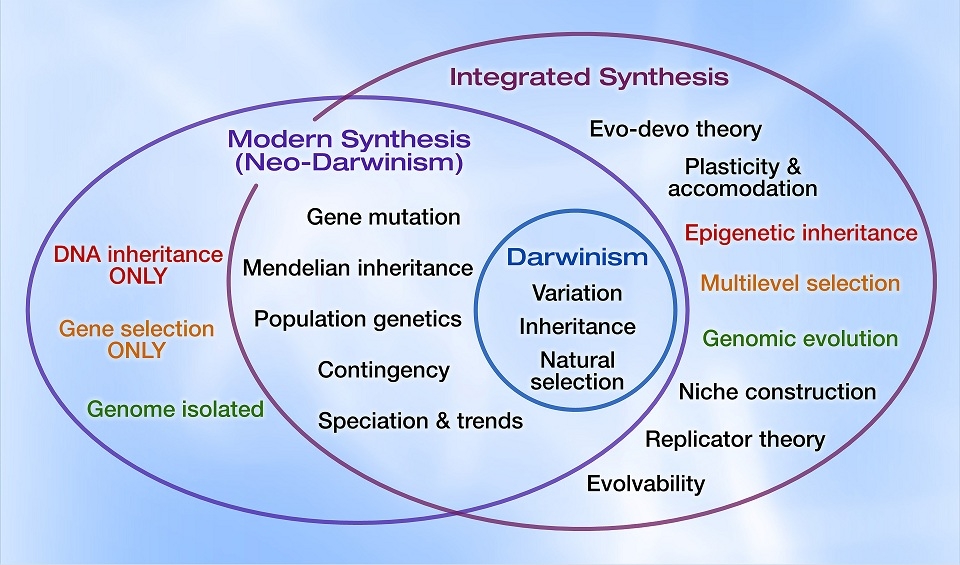Further illusions: On key evolutionary mechanisms that could never fit with Modern Synthesis
The article "Further illusions: On key evolutionary mechanisms that could never fit with Modern Synthesis" by Radomir Crkvenjakov and Henry H Heng critically examines the Modern Synthesis (MS) of evolution, which is the prevailing theory of evolution in the biological sciences. The authors argue that the MS is based on a number of false assumptions, including the following:
That the gradual accumulation of gene mutations within microevolution leads to macroevolution.
That present evolutionary events can be linearly extrapolated to the past to reconstruct Life's history.
That stasis, as the most prominent pattern of the deep history of Life, is a puzzle to the MS.
The authors argue that these assumptions are false because they ignore the role of system information in evolution. They argue that system information is maintained by species-specific karyotype code, and that macroevolution is based on the whole genome information package rather than on specific genes. They also argue that the fossil record does not support the MS's preferred theory of gradual change, but instead shows that stasis is the most common pattern of evolution.
The authors conclude that the MS is a fundamentally flawed theory of evolution, and that it is time to move beyond it. They argue that a new theory of evolution should be based on the role of system information in evolution, and that it should take into account the fossil record, which shows that stasis is the most common pattern of evolution.
The article "Further illusions: On key evolutionary mechanisms that could never fit with Modern Synthesis" is a valuable contribution to the debate about the Modern Synthesis. The authors raise important questions about the assumptions of the MS, and they offer a new perspective on the role of system information in evolution. The article is well-argued and well-referenced, and it is a must-read for anyone interested in the science of evolution.
Here are some additional thoughts on the article:
The authors' argument that the MS is based on false assumptions is persuasive. The evidence they present shows that the MS does not take into account the role of system information in evolution, and that it does not accurately reflect the fossil record.
The authors' proposal for a new theory of evolution is intriguing. They argue that a new theory should be based on the role of system information in evolution, and that it should take into account the fossil record. This is a promising direction for future research.
The article raises important questions about the nature of evolution. What is the role of system information in evolution? What is the relationship between microevolution and macroevolution? What can we learn from the fossil record about the history of life? These are all important questions that deserve further study.
Overall, the article "Further illusions: On key evolutionary mechanisms that could never fit with Modern Synthesis" is a valuable contribution to the debate about the Modern Synthesis. The authors raise important questions about the assumptions of the MS, and they offer a new perspective on the role of system information in evolution. The article is well-argued and well-referenced, and it is a must-read for anyone interested in the science of evolution.
Article snippets:
gradual accumulation of gene mutations within microevolution leads to macroevolution, requires reexamination.
MS lacks distinction among the two basic types of information: genome-defined system and gene-defined parts-information, as its treatment was based mostly on gene information
system information is maintained by species-specific karyotype code, and macroevolution is based on the whole genome information package rather than on specific genes.
Linking the origin of species with system information shows that the creation and accumulation of the latter in evolution is the fundamental question omitted from the MS.
modern evidence eliminates the MS's preferred theory that present evolutionary events can be linearly extrapolated to the past to reconstruct Life's history, wrongly assuming that most of the fossil record supports the gradual change while ignoring the true karyotype/genome patterns
stasis, as the most prominent pattern of the deep history of Life, remains a puzzle to the MS, but can be explained by the mechanism of karyotype-preservation-via-sex.
the concept of system-information is smoothly integrated into the two-phased evolutionary model that paleontology requires (Eldredge and Gould
The availability of alternative concepts further illustrates that it is time to depart from the MS.




Comments
Post a Comment